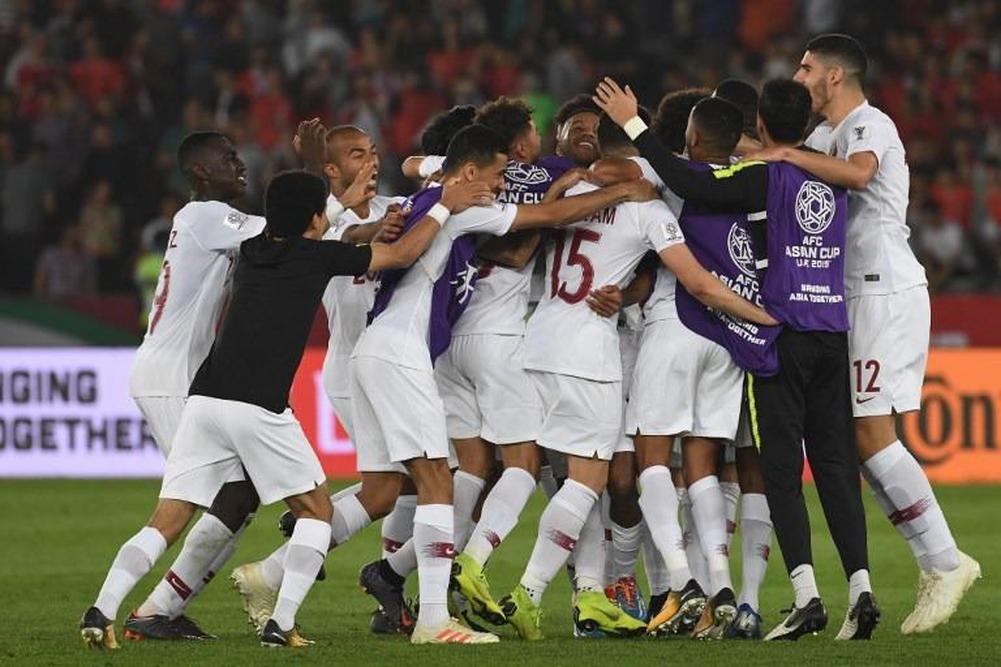[Image Credit: beIN Sports]
On 9th of March 2015 it was announced that the United Arab Emirates would be hosting the 2019 Asian Cup finals, positioning itself two years before Qatar and the Middle East holds their first ever World Cup. The backdrop to the tournament obviously has been orbiting the Middle East blockade.
Since roughly mid-2017 there was been a blockade between Qatar and Saudi Arabia, United Arab Emirates, Bahrain, Egypt, the Maldives, Mauritania, Senegal, Djibouti,
The tensions were felt throughout the tournament, with a curious blockade derby occurring in the semi-final between UAE and Qatar, with Qatar being the successors – and subsequently, UAE fans throwing shoes on the pitch in their frustration. Following their fans vexation, UAE’s football governing body accused Qatar of fielding ineligible players – referring to the number of Qatar players, who were not born in Gulf nation. The players in question were, Almoez Ali, a Sudan-born striker, and Bassam al-Rawi, an Iraqi-born defender – nonetheless, the claims never came to fruition.
It was a peculiar tournament in football terms, as many of the big names dropped out far earlier than expected: Australia were undone by hosts UAE; the tight-led defence of Iran collapsed to a Japan side which golden generation has forgone, who were thoroughly dissected by a well-organised Qatar; and South Korea was also caught out by eventual winners, Qatar, whom Tottenham Hotspur are sincerely thankful – as Son Heung-min was relinquished back to them. The overall standard of the tournament did feel subpar, with a lot of sides not bringing performances expected of them. Some criticism, to this lack of quality, has been ascribed to the changing of the format from a 16 team tournament, to a 24 team; however, some of the best games came from these plucky underdog sides – highlights of the tournament, as a whole, were very much the wins of Jordan over Australia, and India’s first win in the finals since 1964.
The final itself would have to be described as a cagey affair, even though it contained 4 goals. Qatar took the lead through a brilliant bicycle kick from Zainalabiddin Abdulla – although, the Japanese goalkeeper Gonda should have done a lot better. Qatar, subsequently, doubled their lead as Abdulaziz Hatem stroked the ball beautifully into the top corner, reminiscent overpowered finesse shot from Fifa 11. Japan replied to this two goal deficit, with energetic attacks on the Qatar penalty area; however, Qatar, who were the best organised sides of the tournament, showed to be resilient until Minamino squirmed through in the 69th minute to bring Japan back into the tie. This was the first goal Qatar had conceded in over 10 hours. The result was finalised as Southampton defender, Yoshida, became the perpetrator of a hand-ball in the box which had been caught via VAR; Afif calmly put away the penalty, as the final ten minutes came to a mere formality.
The attendances throughout the tournament were low, with a group game between Qatar and North Korea attracting around four hundred people. While it is obvious why many from North Korea were not present, the Qataris are due to the blockade between the UAE and Qatar. Throughout the severed diplomatic relations between the Gulf States, one ruling is that no Qataris are allowed to enter UAE. Even support for the nation of Qatar is a criminal offence, this is not in a football sense but showing sympathy towards Qatar. A British fan was assaulted in Abu Dabhi.
What does this mean for Qatar?
For Qatar the tournament could not have gone any better, there have been many questions about how well Qatar will do in their first ever tournament and this showed all the signs that they should be fairly prosperous. Political agenda aside, you do want the host nation of any tournament to do well – and Qatar performance looks like they may play more than the four group games. Much of the praise should be owed to coach Felix Sanchez who once coached the golden generation of Barcelona from 1996-2006 – this era produced Xavi, Iniesta, Sergio Busquets, and Messi. Of course, this was not all the doing of Felix Sanchez, but not many people you would rather have to nurture an improving squad.
Next up for Qataris side is this year’s Copa América in South America, with Japan coincidentally; due to the number of countries in South America, other nations are invited to make up the numbers – usually, one or two, North American nations. The choice of countries are chosen on nations which are not expected to change the tournament, they are added merely to even the amount in each group; after the organised display at the Asian Cup, Qatar should aim to get to the knockout stages.

